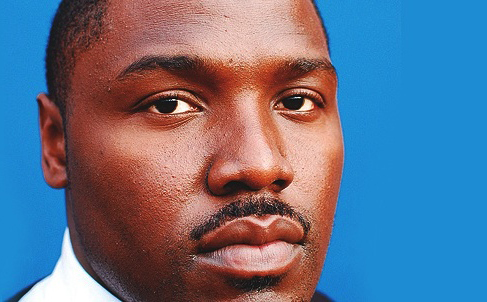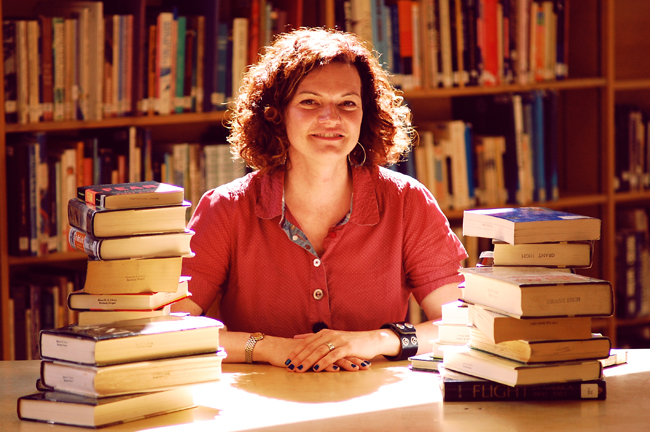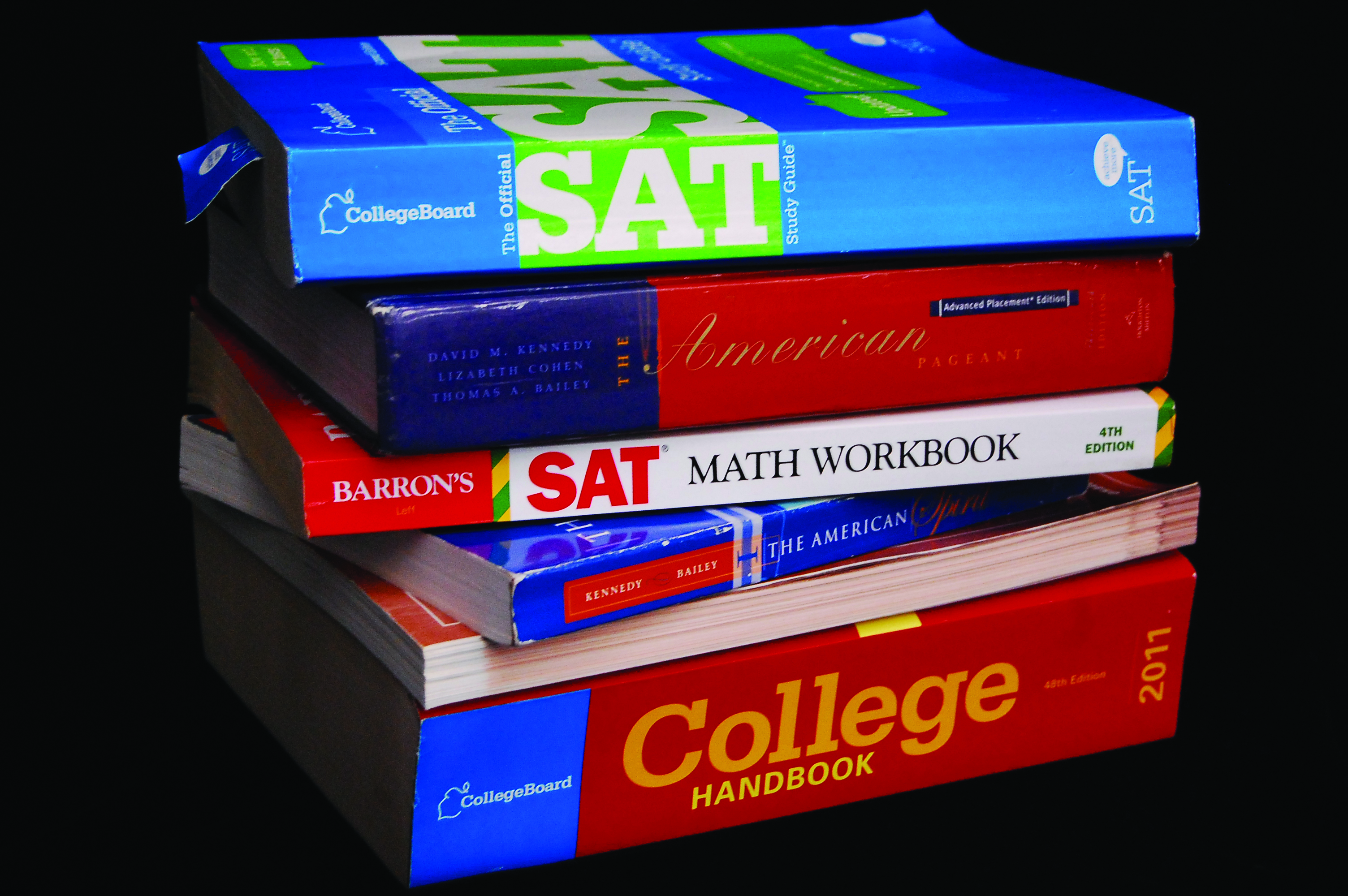
In Center Hall, Marty Williams wades into a sea of students. He stops a boy who is frowning, offers a firm handshake and then pulls him in for a half hug. The boy cracks a smile and then heads off to class.
Williams, who works with transfer students and is an assistant football coach, chats for a few minutes with one of the school counselors and some of the Grant security guards before heading to his office. He wants to check on some of “my kids,” as he calls them. Some are struggling academically. Others have lives steeped in family issues around divorce, drugs and alcohol, or social problems
Later that day, Williams works on defensive schemes with some of the players. They circle for a pep talk from Williams, a bear of a man.
After practice, he heads home, grabs something to eat and heads over to a North Portland church. Choir practice awaits. His 25-person group is preparing for a holiday concert in Seattle. As the piano player leads the singers, Williams leans back and belts out a solo like it’s coming from a professional singer.
Williams wears many hats at Grant: adviser to students, coach, friend, colleague and mentor. But what many in the Grant community don’t know is that the characteristics he displays come from a childhood experience of pain and uncertainty, love, sacrifice and a solid devotion to family.
“He is,” says his long-time mentor Mary Etta Wells, “the most genuine person I know.”
Williams was born on March 13, 1980, in Michigan City, Indiana. As a child, he moved between living with his mother in Oregon and his father in Michigan.
Both of his parents struggled with alcohol problems and Williams was never able to stay in one place for a very long time. After spending his freshman year of high school in Michigan, he moved to Portland to live with his grandmother, Bertha Mohamed.
Mohamed already had her work cut out for her. She was taking care of her step-father and Williams’ great grandfather, Arthur Coleman, who was 82. Coleman was blind and she had cared for him ever since her mother passed away. It didn’t matter. Williams was family and he needed a stable environment, so Mohamed traveled to Indiana, packed him up and brought him to Portland.
At Grant, Williams established himself as a dominant three-sport athlete, playing football, basketball and running track. Football was his favorite. By the end of his sophomore year, Williams was getting noticed for his powerful and agile running game. A number of then-Pac-10 universities were looking to recruit him. And his dream school – the University of Michigan – was looking for a way to lure him there.
The attraction of major schools could’ve inflated Williams’ ego. But his grandmother held things in check. She kept him focused on schoolwork. It was important and she didn’t want him to forget that education was going to be the real way to success.
“I didn’t get everything really quick so I worked harder than everyone else,” Williams recalls. “I spent a lot of time in classrooms just trying to get it done.”
Social studies teacher Dan Anderson was one of the teachers Williams turned to for guidance.
“There wasn’t enough adult interaction with him, so Marty needed a little extra push and a little extra help,” Anderson recalls. “I would check on his classes, meet with his teachers occasionally and then

when it was necessary and a big project came up he would come into my office and work on it.”
Anderson remembers once having Williams over to his house where he worked for nearly five hours to finish off a project.
“I really don’t tell him this enough but that man is the whole reason I was able to make it to college,” Williams says. “Without him, I wouldn’t be the man I am today.”
As senior year rolled around, Williams’ grades were good and he couldn’t be stopped on the football field. It wasn’t uncommon to see him carrying two, sometimes three defenders on his back as he carried the ball. Yet, he never bragged. He remained as humble as ever.
“It’s really just the way I was raised,” Williams says now. “Everything was a privilege and that included football.”
Rather than going out with his teammates after the games, Williams would go home and spend a quiet night in with his grandmother. Sometimes, they’d watch Friday Night Flights to see if Williams made the highlights.
His work on the field paid off when Michigan offered him a chance to play Division I football. Williams was excited about his future. Then disaster struck: Both his grandmother and great-grandfather fell ill as his senior year ended.
For Williams, though, there was no debate. He didn’t go to Michigan.
“She had sacrificed so much for me already, I felt it wasn’t even a choice for me to leave her,” he says now.
He helped nurse her back to health, but Coleman – his great-grandfather – passed away. Williams took time off and worked part time at a clothing store and ran errands for a law firm.
Jody Stahancyk, the head of the law firm Williams ran errands for, took Williams and his cousin to a Linfield College football game. Stahancyk graduated from Linfield and felt that it would be a good fit for Williams.
At the game, Williams met some of the coaches and felt like he could fit in. He applied to the school and joined the team.
By his senior year, Williams received multiple letters from National Football League scouts expressing interest in his abilities. Four games into the season, he was averaging about 200 yards a game.
In his next game, something happened that changed his life again. “I was supposed to have already been out” of a game, recalls. “But I came back in, got the ball, went to set a guy up and the turf was a little moist and my knee just blew out.”
He tore all four of his main ligaments in his knee and damaged some of the nerves. The injury was so bad that he couldn’t lift his right foot.
Williams learned a valuable lesson. “I had a lot of thinking to do,” he recalls. “I saw football as a way to succeed and take care of my family. But I wasn’t thinking that I still had my education. It took a lot of faith and being around good people that could help me. It taught me that believing was key.”

He graduated in 2002 with a major in religious studies and later went to work for Self Enhancement Inc., an agency that works with at-risk kids. But then he got a chance to come work at Grant.
About six years ago, Williams was at church when he saw Michelle Braxton selling brownies as a fundraiser. Each week, he’d wait until they were almost gone and then approach to see if they were still for sale. Each week, gave him more. A relationship blossomed and they married in 2006.
Last year, Williams worked a lot with special education students, particularly those who were medically fragile. He built a relationship with a freshman named Joshua Montoya, who was in a wheelchair. “It’s different when you’re just around somebody than when you’re taking care of somebody,” Williams says.
During the year, Joshua passed away and Williams was devastated. “It was an eye opener for me to really appreciate those who are close to you,” Williams says. “Whenever he smiled, he would brighten people’s days. He was a happy, normal kid that just happened to have something wrong with him. But he still got up every day and tried his best.”
Today, Williams prowls the halls, checking on his students and making sure they stay on task. “I enjoy starting with them, when they are kind of skeptical,” he says. “And by the time you get through talking to them and you stay consistent, they’re more confident in themselves and academically.”
At home, Williams has taken in his cousin Isaiah Pernell, a student-athlete at Grant. Pernell comes from a similar situation to what Williams faced as a kid, so Williams is able to relate to him. He’s a father figure and he pushes Pernell.
“Sometimes we get irritated with each other but that happens with everyone. I would say 90 percent of the time were cool and cracking jokes,” Williams says.




